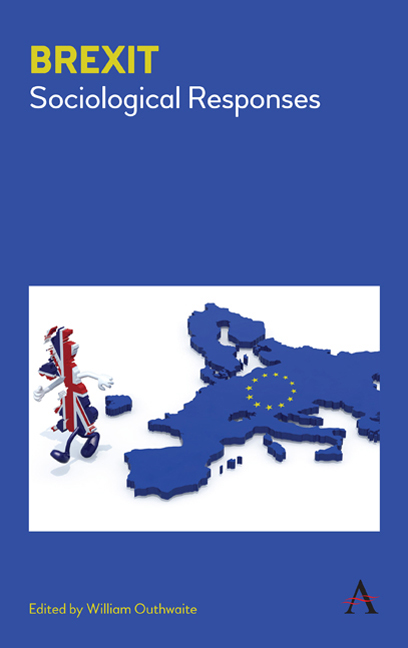Book contents
- Frontmatter
- Contents
- Preface
- Section 1 HOW DID IT HAPPEN?
- Chapter One The Increasing Inevitability of That Referendum
- Chapter Two Vox Populi: Nationalism, Globalization and the Balance of Power in the Making of Brexit
- Chapter Three Exit from the Perspective of Entry
- Chapter Four Brexit, Sovereignty and the End of an Ever Closer Union
- Section 2 THE POLITICS OF BREXIT
- Section 3 PROSPECTS FOR/ AFTER BREXIT
- Notes on Contributors
- Index
Chapter One - The Increasing Inevitability of That Referendum
from Section 1 - HOW DID IT HAPPEN?
Published online by Cambridge University Press: 10 January 2018
- Frontmatter
- Contents
- Preface
- Section 1 HOW DID IT HAPPEN?
- Chapter One The Increasing Inevitability of That Referendum
- Chapter Two Vox Populi: Nationalism, Globalization and the Balance of Power in the Making of Brexit
- Chapter Three Exit from the Perspective of Entry
- Chapter Four Brexit, Sovereignty and the End of an Ever Closer Union
- Section 2 THE POLITICS OF BREXIT
- Section 3 PROSPECTS FOR/ AFTER BREXIT
- Notes on Contributors
- Index
Summary
If the United Kingdom had responded positively to the 9 May 1950 Schuman declaration and if it had subsequently signed the Treaty of Paris establishing the European Coal and Steel Community (admittedly, two very big ‘ifs’), there would surely have been no referendum. When, in May 1945, Winston Churchill, then prime minister, suggested that a referendum be held on whether to extend the life of the wartime coalition until Japan had been defeated, the deputy prime minister, Clement Attlee, refused, declaring, ‘I could not consent to the introduction into our national life of a device so alien to all our traditions as the referendum which has only too often been the instrument of Nazism and Fascism’ (quoted in Bogdanor, 1981, p. 35).
The same could surely have been claimed about the 25 March 1957 Treaty of Rome. Harold Macmillan had only taken over from Anthony Eden at the beginning of that year, but his Conservative government was still sitting on a 60- seat majority. The same, lastly, could surely also have been observed had the UK's 1961 application not been vetoed by President Charles de Gaulle. Following the October 1959 General Election, Macmillan had been returned with a 100- seat majority. Announcing the application to the Commons, Macmillan declared that ‘no agreement will be entered into until it has been approved by the House’ (1961). The subsequent vote was unambiguous: 313 votes to 4, with the Labour Opposition and some fifty Conservative Members of Parliament (MPs) abstaining. There was no mention of a referendum and no call for one. But that first 1961 move contained significant seeds of future complications.
First, the UK did not apply alone. The Danish and Norwegian economies were so closely tied to the UK's that they sent in their applications shortly after the UK's. Although never a European Free Trade Association (EFTA) member, Ireland's economy was so closely tied to the UK's that it anticipated the British application. When de Gaulle rejected the UK's application at the eleventh hour, the three other applicant countries withdrew their candidatures. A symbiotic relationship had been established – the four would always be seen as a bloc (de Gaulle later dismissively referred to the group as ‘the British and their associates’ (cited in George, 1994, p. 38)) – and all of them, with the sole exception of the UK, had constitutional provisions for the holding of referendums.
- Type
- Chapter
- Information
- BrexitSociological Responses, pp. 3 - 18Publisher: Anthem PressPrint publication year: 2017

